

International Foundation for Action Learning – IFAL. 10 Best Practices for Action Learning Projects. Action learning. According to Confucius, I hear and I forget ; I see and I remember ; I do and I understand.
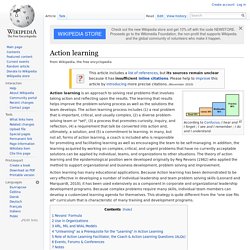
Action learning is an approach to solving real problems that involves taking action and reflecting upon the results. The learning that results helps improve the problem-solving process as well as the solutions the team develops. The action learning process includes (1) a real problem that is important, critical, and usually complex, (2) a diverse problem-solving team or "set", (3) a process that promotes curiosity, inquiry, and reflection, (4) a requirement that talk be converted into action and, ultimately, a solution, and (5) a commitment to learning.
In many, but not all, forms of action learning, a coach is included who is responsible for promoting and facilitating learning as well as encouraging the team to be self-managing. Briefing on Action Learning. Learning at work: Good Practice in Workbased Learning. What Is Action Learning? Action Learning (AL) has been widely used for over fifty years as a highly effective problem solving and personal development process. It is a form of learning "from doing", where the classroom is the job environment or an individual’s personal surroundings, and where emphasis is placed on an individual’s responsibility for their own learning, although supportive but challenging learning partnerships are made available. More recently it has been used to provide a common language for knowledge sharing and sense making particularly in networks and groups e.g. communities of practice. Since the mid-90's The Leadership Alliance Inc. Action Learning & Action Learning Sets.
Action Learning & Action Learning Sets Introduction to Action learning So what is Action Learning? Components of Action Learning. Action learning and multi-rater feedback as leadership development interventions: Popular but poorly deployed - Journal of Change Management - Volume 3, Issue 4. Action learning and multi-rater feedback are today among the most widely used interventions for leadership development.
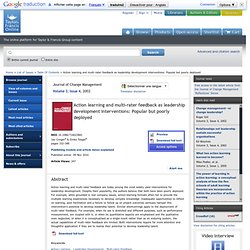
Despite their popularity, the authors believe that both have been poorly deployed. For example, while grounded in real company issues, action-learning formats often fail to provide the multiple learning experiences necessary to develop complex knowledge. Inadequate opportunities to reflect on learning, poor facilitation and a failure to follow up on project outcomes seriously hamper this intervention's potential to develop leadership talent. Similar shortcomings apply to the deployment of multi-rater feedback. For example, when its use is stretched and different purposes, such as performance measurement, are coupled with it, or when its quantitative aspects are emphasised and the qualitative ones neglected, or when it is conceptualised as a single event rather than as an enduring system, the actual capabilities of multi-rater feedback are limited.
Keywords. Action Learning in the Cloud. Action Learning Sets. Action Learning Set Guide. A Process for Action Learning Sets. Action Learning Cycle Worksheets. Bright Horizons for Action Learning. Contrast between training & change paradigms. PARTICIPATING IN WORKBASED LEARNING GROUPS. Knowledge of the Experiential Learning Cycle is essential for peer helpers. The Peer Helper Trainer Experiential Learning Cycle by Rey Carr and Grey Owl A thorough knowledge and understanding of the Experiential Learning Cycle (ELC) as developed by de Rosenroll, Saunders, and Carr (1992) and Grey Owl (1996) is essential for all levels of peer helper training.
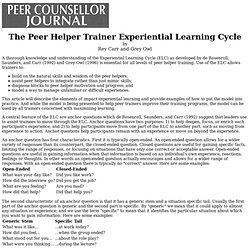
Use of the ELC allows trainers to: build on the natural skills and wisdom of the peer helpers; assist peer helpers to integrate rather than just mimic skills; diagnose blocks to peer helper motivation and progress; and model a way to manage unfamiliar or difficult experiences. A central feature of the ELC are anchor questions which de Rosenroll, Saunders, and Carr (1992) suggest that leaders use to assist trainees to move through the ELC. An anchor question has four characteristics. The second characteristic of an anchor question is that it has a generic stem and a situation specific tail. The next characteristic of an anchor question is based on its use in the ELC.
Useful References Abbey, D. Kolb's Learning Styles and Experiential Learning Cycle. By Saul McLeod published 2010, updated 2013 David Kolb published his learning styles model in 1984 from which he developed his learning style inventory.
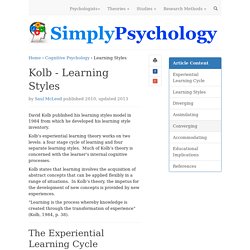
Kolb's experiential learning theory works on two levels: a four stage cycle of learning and four separate learning styles. Much of Kolb’s theory is concerned with the learner’s internal cognitive processes. Kolb states that learning involves the acquisition of abstract concepts that can be applied flexibly in a range of situations. In Kolb’s theory, the impetus for the development of new concepts is provided by new experiences. “Learning is the process whereby knowledge is created through the transformation of experience” (Kolb, 1984, p. 38). Teaching and learning approaches.
Year 11-13 - Key Areas of Learning: Health, Physical Education, Food and Nutrition, Family and Childcare Teaching and learning approaches Experiential learning cycle This learning cycle can be applied to all activities where students learn through doing. Students need to process content material in order to derive meaning from it and to construct knowledge associated with it. A common approach used to facilitate this is the experiential learning cycle, which "begins with activity, moves through reflection, then to generalizing and abstracting and finally to transfer" ( Henton, 1996 , page 39).
When designing activities, it is important to remember that the purpose is to create situations where students get to work with the relevant content. Questions in Action Learning. Action research and action learning for community and organisational change. Kurt lewin: groups, experiential learning and action research. Contents: introduction · life · field theory · group dynamics · democracy and groups · t-groups, facilitation and experience · action research · conclusion · further reading and references · links. see, also : the groupwork pioneers series Kurt Lewin’s (1890-1947) work had a profound impact on social psychology and, more particularly for our purposes here, on our appreciation of experiential learning, group dynamics and action research.
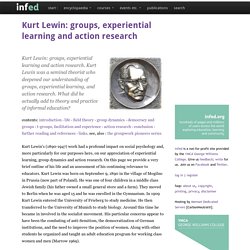
On this page we provide a very brief outline of his life and an assessment of his continuing relevance to educators. Kurt Lewin was born on September 9, 1890 in the village of Mogilno in Prussia (now part of Poland). He was one of four children in a middle class Jewish family (his father owned a small general store and a farm). They moved to Berlin when he was aged 15 and he was enrolled in the Gymnasium. The University of Iowa remained Kurt Lewin’s base until 1944. Field theory Group dynamics Interdependence of fate. Creating Opportunities for Reflection in Action Learning: Nine Important Avenues. Robert L.
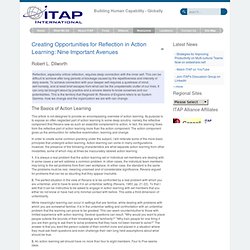
Dilworth. Facilitating Learning in Groups. FACILITATING WORKBASED LEARNING GROUPS. Action Learning and Leadership. Leadership Development via Action Learning. Does Action Learning Promote Collaborative Leadership.pdf. Action research for professional development. Concise advice for new action researchers Jean McNiff First and Second Editions © Jean McNiff 1995, 1997 Third edition © Jean McNiff 2002Click here to download in Word Format (100 KB) This abridged version of the booklet is also available in a more expanded book form, from www.september-books.com – please see the weblink in the 'What's new' box on the home page.
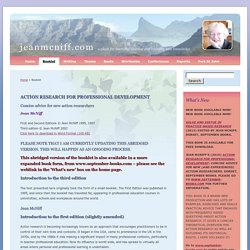
Introduction to the third edition The text presented here originally took the form of a small booklet. Jean McNiff Introduction to the first edition (slightly amended) Action research is becoming increasingly known as an approach that encourages practitioners to be in control of their own lives and contexts. This text aims to provide some general answers for the many people who ask, ‘What exactly is action research?’ You should know that there are different approaches to action research, as is true of scientific enquiry in general. This booklet offers one particular approach to action research. Jean McNiff.